What to expect from Palliative Care in an aged care home
If you or someone you love is living with a life-limiting illness, a palliative approach to care in a residential aged care home can help you to cope and know what to expect during the end-of-life stages.
Scroll to Explore
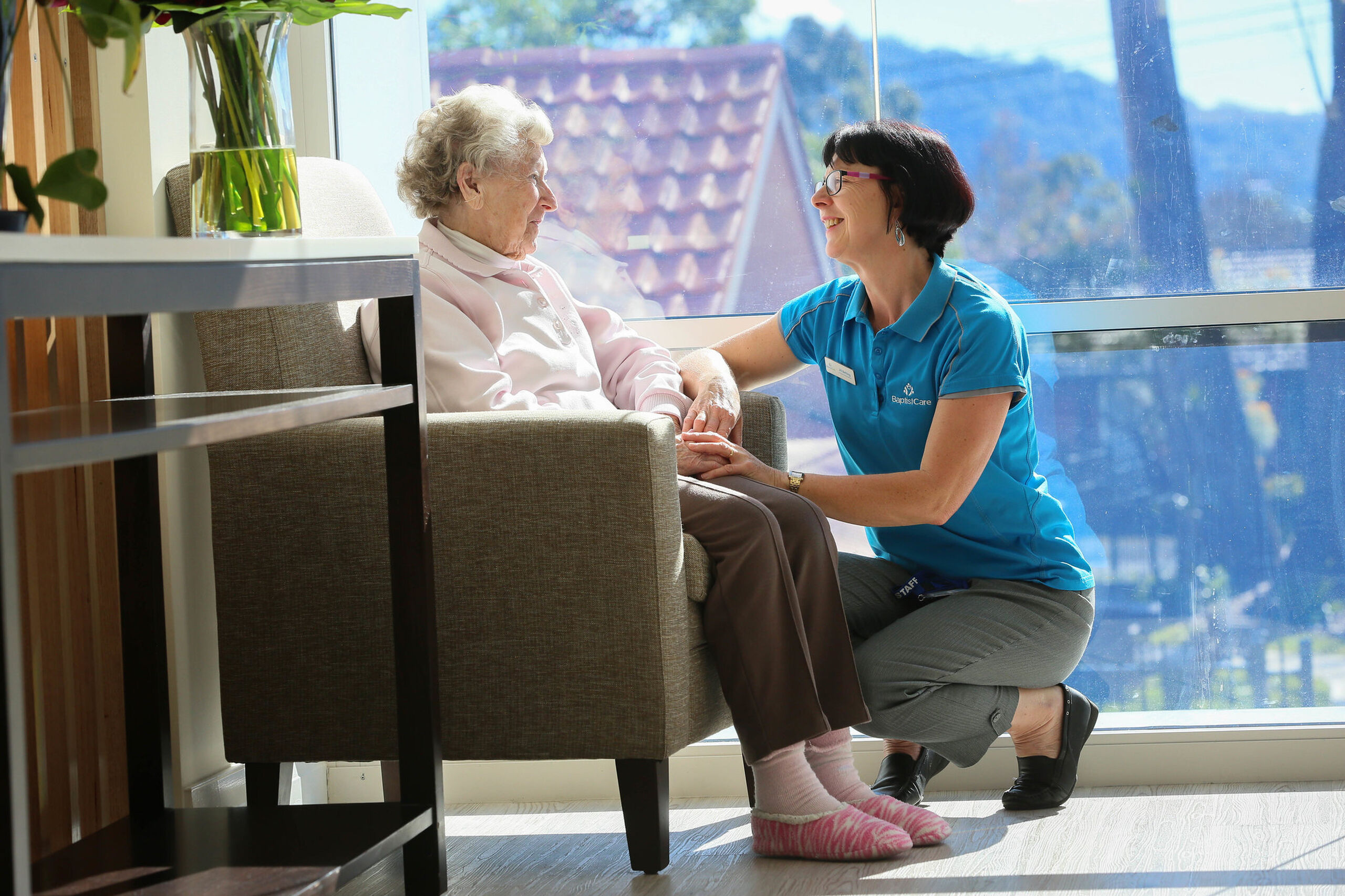
02 November 2023
Stories
| Aged Care Homes, BaptistCare
What to expect from palliative care in an aged care home.
If you or someone you love is living with a life-limiting illness, a palliative approach to care in a residential aged care home can help you to cope and know what to expect during the end-of-life stages.
Download this article as a PDF.
If you or someone you love has a life-limiting illness and is receiving palliative care within a residential aged care home setting, you may be wondering what to expect over the coming weeks and months.
If you’re a family member or friend, you may also want to know how you can best support your loved one through these final stages of their life.
According to Carolyn, a Palliative Care Consultant at BaptistCare with over 25 years of experience in this field, understanding what the persons wishes are surrounding their care and educating yourself around the signs, symptoms, and natural process of dying is one of the best ways you can prepare.
Drawing on Carolyn’s expertise, our blog offers a good place to start.
Jump to:
What is palliative care and who needs it?
Palliative care is a specialised type of care that enables an individual and their family to cope with a life-limiting illness. It also supports them to have a natural and dignified death.
“Very often in the residential care home setting, we see older people who are living with several chronic, life-limiting conditions simultaneously,” says Carolyn. “Our palliative care teams are highly skilled in managing the symptoms arising from their illnesses and optimising their quality of life.”
While palliative care is centred around the person who is dying – it also provides valuable support for their family.
“It’s helpful to think of the palliative care model as concentric circles,” explains Carolyn. “The individual is at the centre, surrounded by their family and loved ones, the care team in the home, their medical practitioner, and the palliative care team. There are many layers of support.
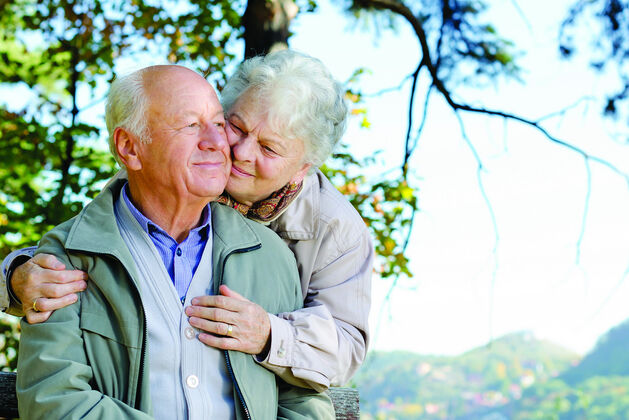
Is palliative care the same as end-of-life care?
End-of-life care is a component of palliative care and is the final stage.
During this time, the person’s palliative care team provide more intensive care to facilitate a natural, dignified death in line with the person’s wishes.
According to Carolyn, palliative care is often mistaken for end-of-life care.
“People often hear palliative care and think that the person is going to die imminently. However palliative care can be ongoing for weeks, months, or even years.”
Conversely, the end-of-life process can last anywhere from three to ten days.
“Just like with birth, there are common signs and symptoms that help us to know death is near,” explains Carolyn. “We support the family and prepare them for these signs, as it can be a great comfort to know that what your loved one experiences is completely normal and expected.”
End-of-life care relieves many of the common physical symptoms associated with dying, such as breathlessness, pain, or anxiety.
“We can provide medications that manage all of that beautifully,” says Carolyn. “We can also support people through any kind of emotional distress - however everything we do is in line with the person’s wishes and Advance Care Plan.”
What’s an Advance Care Plan (ACP)?
The Advance Care Plan is a process of communication that enables individuals to make plans about their future health care for when they are no longer in a position to communicate their own healthcare choices; it ensures that the person receives the palliative care they what.
The Advance Care Plan’s main objective is to detail the person’s wishes for their end-of-life care needs and, according to Carolyn, is reviewed and updated throughout the palliative care process.
“The Advance Care Plan doesn’t legally come into play until the person can no longer speak for themselves. Up until that point, the person may override their Plan at any point.”
“It can include anything and everything,” says Carolyn. “For example, some people may prefer to be pleasantly sedated at the end of their life, others want to be awake and alert. Some people might request to have rosary beads within reach or diffusers with meaningful scents, they might like certain music playing, or even having their pet in the room with them. We try to accommodate as much as we can.”
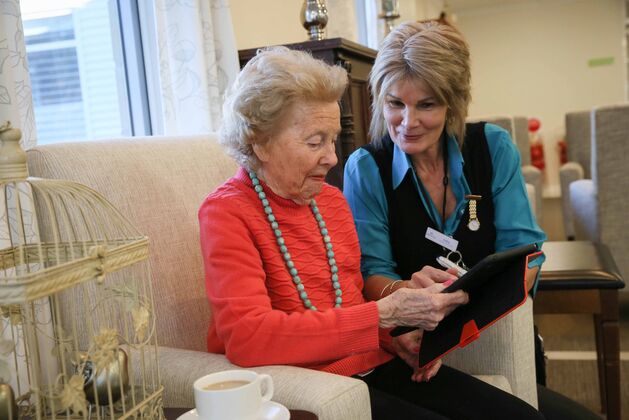
Who provides palliative care?
The palliative care team in a residential aged care setting will usually include:
- Registered Nurses - available 24/7 in all BaptistCare residential aged care homes.
- Chaplains - to provide spiritual and emotional support if requested
- General Practitioners – who will visit the person in the residential aged care home
- Palliative care consultant support services – Registered Nurses who are specialised in providing palliative care to support residents and families with the most complex needs.
- Lifestyle Coordinators – Responsible for accommodating residents’ end-of-life wishes as far as possible.
- Care workers – a critical part of the palliative care team. They often have close, trusting relationships with residents having cared for them since their arrival at the residential aged care home.
At BaptistCare, this multi-disciplinary team comes together to support the resident to have the kind of death they want using our Affirm, Balance, Comfort model.
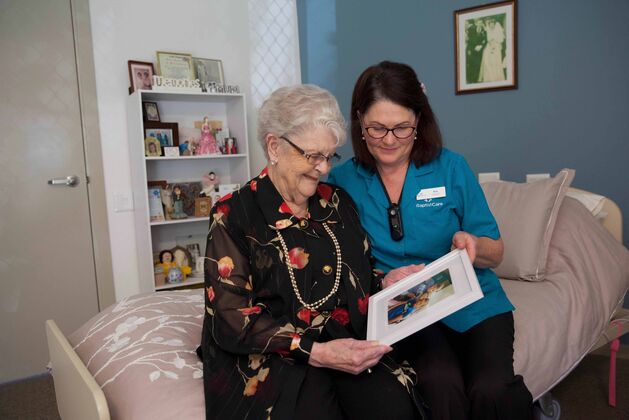
How can I support my loved one while they receive palliative care?
Supporting a loved one through the end stages of their life is emotionally challenging, and it’s important to also take time for self-care.
According to Carolyn, equipping yourself with knowledge is a powerful way to prepare.
“Understanding the signs and symptoms of how our bodies shut down at the end of life can help to relieve any feelings of panic or confusion as we support the person who is dying,” says Carolyn.
“There is no need to feel fearful about end-of-life symptoms – this is the normal and natural process of dying.”
Carolyn encourages family and friends to ask questions, and to become familiar with the preferences that their loved one has requested in their Advance Care Plan.
“Be involved as much as you can be,” says Carolyn. “Remember that everybody is different and there is no right or wrong option. For example, some family members want to be with their loved all the time, others wish to be called at all hours with updates, others prefer to get their rest so they can be alert and strong throughout the day. Do whatever is right for you.”
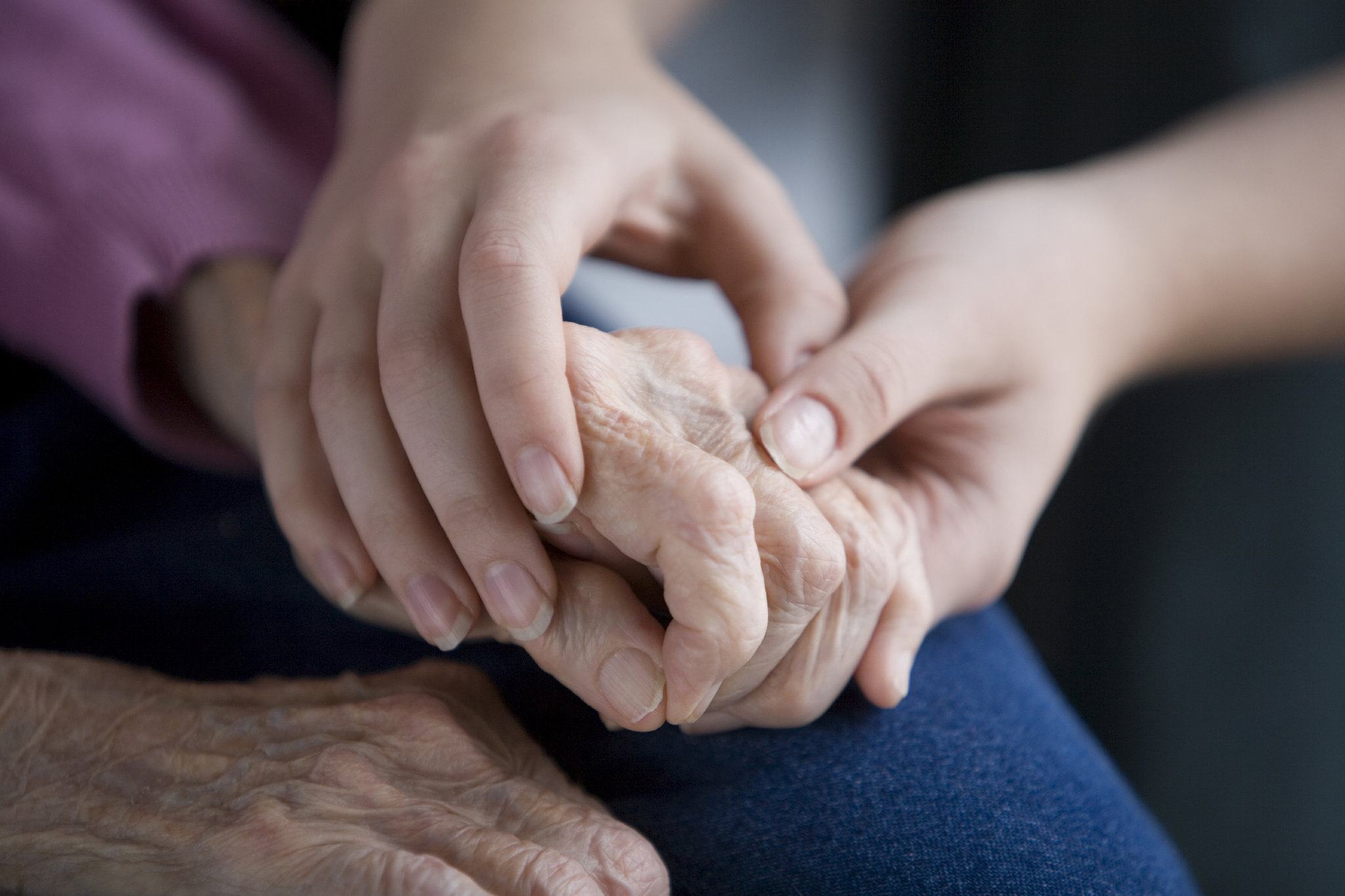
What happens after the person has died?
After the person has died, there will be ample time and space for the family to be with their loved one before their body is taken into the care of the funeral company.
The entire care team is still very active in supporting family and friends after the person has died.
“Palliative care does not end after the death of a resident,” says Carolyn. “We follow the family closely and check how they are coping, as well as continuing to provide support services such as chaplaincy and referrals to grief counsellors if needed.
“Rituals are a very important part of the grieving process. We hold a commemorative service at our residential aged care homes to honour those residents who have recently passed away.”
Carolyn says these services are as much for the family as they are for the person’s care teams and fellow residents.
“Death and dying are not topics many people want to think about, but in residential aged care, they are a part of our everyday lives,” says Carolyn.
“At BaptistCare, we believe that with the right care and support, death can be a dignified, peaceful experience – making the grieving process that bit easier for loved ones.”
Find a BaptistCare Residential Aged Care Home near me
If you would like to know more about our palliative care services within residential aged care homes, why not chat with one of our friendly team – we’d be happy to talk with you about your situation and care needs and organise a tour around your nearest BaptistCare home.
Use our simple online search tool to explore BaptistCare Aged Care Home locations across New South Wales and the ACT.
Click the link below to learn more about BaptistCare's
Residential Aged Care | MyTeam | Understanding Aged Care | Financial Guide | Find a centre